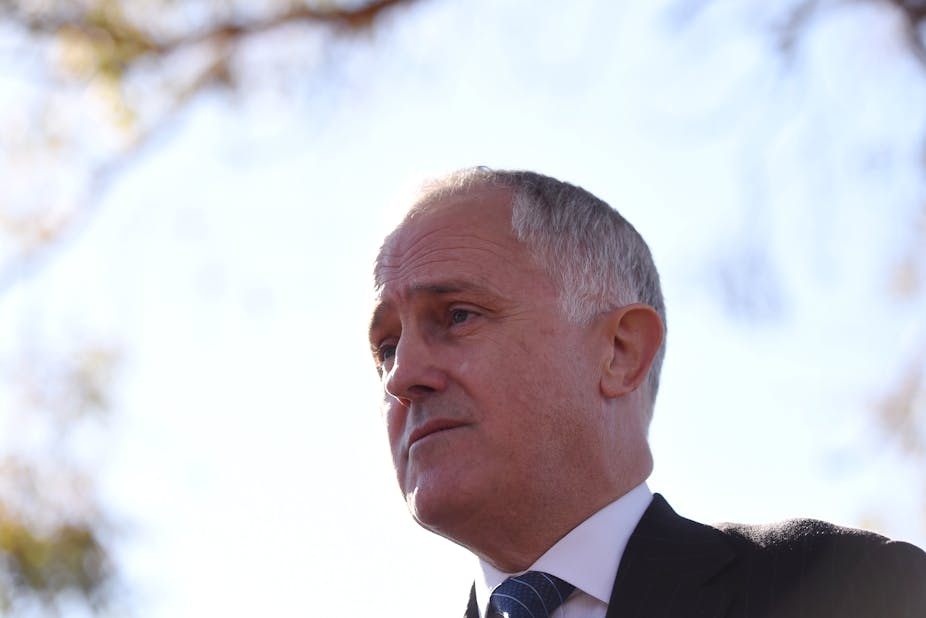Malcolm Turnbull has laid down some fundamental principles for the citizenship debate in an intervention that seems driven by conviction and wanting to explain his position rather than a view to self-interest.
In extensive remarks, Turnbull warned against “bravado” and expounded on the rule of law and constraints on government.
And, centrally, Turnbull declared that well-informed people with good intentions could legitimately differ over the proper balance between national security and citizenship.
In Turnbull’s mind, on these issues, group-think isn’t mandatory for Team Australia.
Turnbull’s nuanced message contrasts with Tony Abbott’s black-and-white one. And it contains more restraint and warning than a hot-to-trot backbench is attuned to or wants to hear.
In theory, the Turnbull line would also give the opposition room to argue – if it dared – that it doesn’t always have to be the government’s echo on national security issues.
As angst over last week’s cabinet leak bubbled among ministers and backbenchers, both Turnbull and Foreign Minister Julie Bishop denied (in her case, again) being the source. Industry Minister Ian Macfarlane said if people couldn’t maintain confidentiality they should “leave the cabinet”.
Turnbull and Bishop were among half-a-dozen ministers who resisted the more radical aspects of proposals brought to cabinet by Immigration Minister Peter Dutton, backed by Abbott, for a citizenship crackdown against those involved in terrorism.
Bishop invoked a Gillard precedent, saying she released any press gallery journalist “of any obligation to maintain the confidentiality of the source insofar as it relates to me”. Gillard when deputy prime minister gave a similar “release” to anyone who’d heard her being disloyal to Kevin Rudd – not that such “releases” mean anything in practice.
Turnbull had obviously decided to use a Queanbeyan news conference on the NBN to set out his views in some detail. They didn’t have to be dragged from him – and later there was some muttering by colleagues about his speaking outside his ministerial area of communications.
Turnbull condemned leaks from cabinet and cabinet committees as “deplorable”, putting the latest into a broader context. “I think there has been far too much of this over some time.”
As for himself, “I don’t leak from cabinet meetings. And I didn’t leak from the last one either” (meaning last week’s meeting).
On citizenship, Turnbull pointed out that to stop dual-citizen foreign fighters returning would take only a minor updating of the existing law that automatically removes Australian citizenship from dual citizens who serve in the armed forces of a country at war with Australia.
But Turnbull highlighted concerns about going beyond that – to act against those working for Islamic State (IS) in Australia, and to cover people with Australian citizenship only who might be eligible for citizenship elsewhere. The government cannot render people stateless, so it can’t remove citizenship from those with nowhere else to go.
Everyone, Turnbull said, including every minister and every MP, was committed to the national security of Australia. “But we’re also committed to the rule of law,” and this meant that the law applied to everybody.
“What is the essence of a democracy? Some people would say that a democracy is one where the majority get to do what they want. That’s not a democracy – that’s a tyranny.
"The genius of a democracy governed by the rule of law, our democracy, is that it both empowers the majority through the ballot box and constrains the majority, its government, so that it is bound by law,” Turnbull said.
“That’s why we have laws that restrain and restrict the actions of government so that it is bound by the law.”
IS hated Australia “because they hate the rule of law. They hate the fact that the government has to stand up, can be stood up by its citizens and held to account.
"So our freedoms are absolutely critical and it is important that we have a debate about this,” Turnbull said.
“Some people like to suggest that some people are tougher on terrorism or tougher on national security than others.
"Let me say this to you. Honest people, knowledgeable people, really well-informed people can have very different views about what the right measures are on national security, and have very different views about the right balance between, say, citizenship and national security.”
Turnbull cited variations in the laws of countries comparable to Australia – the US, Canada, Britain, France – which were equally committed to the fight against terrorism.
“So we need to make sure that we get the balance right.” It was not good enough that laws simply be tough. “This is not a sort of a bravado issue – it is that they have got to be the right laws.”
The government will introduce legislation this month to cover dual citizens; it has community consultations underway about whether to act against Australian-only citizens who might be able to get another nationality.
Abbott told parliament: “We know instinctively that anyone who raises a gun or a knife to an Australian because of who we are has utterly forfeited any right to be considered one of us. That is what we believe.”
Labor has been reluctant to be drawn before it sees the legislation on dual nationals. But Bill Shorten has now flagged the ALP’s likely position on this referring, like Turnbull, to the existing law. “These provisions exist where dual nationals in time of war operate for enemy states against Australia and so if there’s a pragmatic extension to dual nationals which helps maintain our national security, in principle we will certainly think about it very constructively.”
It is the next step – extending revocation to some Australian-only citizens – that would be a major challenge for both government and opposition.
Listen to the latest Politics with Michelle Grattan podcast, with guest, Small Business Minister Bruce Billson, here or on iTunes.

